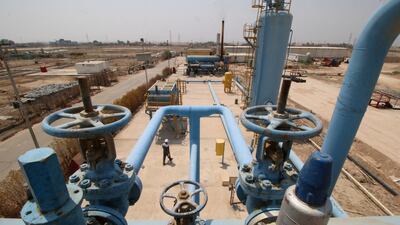Oil exports from Iraq’s semi-autonomous Kurdish region are set to resume next week, ending a nearly two-year dispute over Kurdish crude shipments, Iraq’s Oil Minister Hayan Abdel Ghani said on Monday.
An Iraqi Oil ministry delegation will visit Erbil on Tuesday to discuss transferring 300,000 barrels to Baghdad for export through Turkey’s Ceyhan port, Mr Ghani told reporters on the sidelines of an economy event in Baghdad.
“Tomorrow, a delegation from the Ministry of Oil will visit … the Kurdistan Region to negotiate a mechanism for receiving and exporting oil from the region,” Mr Ghani said. “The export process will resume within a week.”
The move underlines the improvement in Baghdad's fraught relationship with Erbil, the capital of the Kurdish region, which has about 45 billion barrels in oil reserves, according to Kurdish Oil Ministry data.
Oil exports from the semi-autonomous Kurdish region through Turkey have been halted since March 2023 after an arbitration court ruled in favour of Baghdad, saying Ankara had breached a 1973 agreement when it allowed Kurds to pump without Baghdad's consent.
Since then, Baghdad and the region have failed to agree on issues related to resumption of exports, including the approval of deals the Kurds signed unilaterally with oil companies and a system for payment of developers.
The minister's remarks followed media reports saying oil exports from the semi-autonomous Kurdish region might resume as early as next month.
“This is not the first time we have heard suggestions that exports could restart. In addition, if flows were to resume, it would complicate issues around Iraqi output and its compliance with production targets under the Opec+ deal,” ING said in a research note on Monday.

Iraq, Opec's second-largest producer behind Saudi Arabia, has faced challenges in consistently adhering to its assigned output quotas. Opec data shows that the country's oil production stood at 4 million barrels per day last month, a decrease of 5,000 bpd from December.
The group of crude producers has held back 5.86 million bpd of output through a series of measures announced in 2022. These include a cap of 2 million bpd by the entire group, as well as 1.65 million bpd of a first stage of voluntary cuts by eight members – Saudi Arabia, Russia, Iraq, the UAE, Kuwait, Kazakhstan, Algeria and Oman – and another 2.2 million of second-stage voluntary cuts by the same countries.
The issue of developing and exporting oil and gas resources from Iraq’s semi-autonomous Kurdish region stretches back to the 2003 US-led invasion that toppled Saddam Hussein.
Baghdad and Erbil failed to agree on a federal law to govern the oil and gas sector, and the region's authorities signed dozens of oil and gas deals with foreign companies and countries independently. They offered lucrative production-sharing deals, which allowed international oil firms to rapidly recover costs, and split profits between the government and the oil company.
Baghdad rejected that model and tension flared when the Kurdish oil and gas sector took a major blow from Iraq’s Federal Supreme Court, which ruled that the region's law regulating the industry was unconstitutional. The court also demanded the region hand over all of the oil industry’s activities to Baghdad, including exports.
Baghdad and Erbil have agreed on a temporary mechanism of sending loans to pay civil servants and social services as a way to tackle the budget allocation issue, which stipulates the region is entitled to its share only when it hands over 400,000 barrels of oil a day to Baghdad.
Iraq’s Parliament this month approved a budget amendment to subsidise production costs for international oil companies operating in the semi-autonomous Kurdish region, in an effort to unblock northern oil exports.
The amendment sets the rate at $16 a barrel, up from an earlier proposal for $7.90 a barrel for transport and production costs, which was rejected and deemed too low by the Kurdistan Regional Government.
Iraq’s Oil Ministry, in co-ordination with the region’s Ministry of Natural Resources, will appoint an international consultant within 60 days to assess fair production and transport costs, under the new deal.

